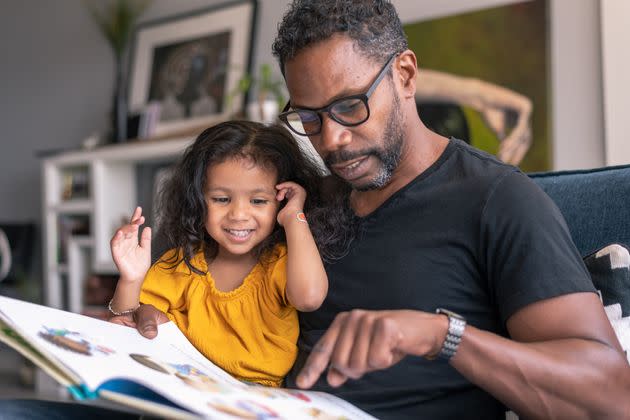The 1 Thing Almost Everyone Gets Wrong About Happiness

According to the 2024 World Happiness Survey, the United States is no longer one of the 20 happiest countries. It’s pretty glum news, but not necessarily surprising.
While some of our stressors and sources of grief are out of our control, or might constitute a “permacrisis,” there’s also a common misunderstanding about happiness that’s plaguing us. This belief often stands in the way of us truly experiencing regular, daily joy.
The misunderstanding in question: that happiness is an end goal, or something we can’t have right now.
In reality, we can cultivate happiness every day and before our goals are met. So why do we think otherwise? Why do we see happiness as an end goal? Here are a few reasons, according to therapists.
The ‘American dream’ ideology.
This viewpoint is partially rooted in cultural and societal norms, according to Hayli Evans, a therapist who specializes in trauma. In the U.S., many of us see productivity and hard work as top-tier. It leads us to constantly chase after the elusive “American Dream” ― the idea that if we’re productive all the time, we’ll be successful, happy and financially stable.
“People are taught that work and play are to be kept separate, and often, we do not prioritize rest at all,” Evans said. “We commonly ‘live for the weekend,’ perpetuating the idea that happiness is something to be chased, or something reserved for later.”
Thanks to this mindset (and thanks to capitalism), there’s always something we feel we should “fix” before we’re “allowed” to be happy, whether it’s our bodies, our relationship status or our job titles.
Then, when we get to that point, we may confront the arrival fallacy, the illusion that meeting a goal brings lasting happiness. Or we might discover that the happiness doesn’t last.
“Our society has turned [achieving happiness and reaching your full potential] into a way to measure success,” said Aurisha Smolarski, a Los Angeles-based therapist, certified co-parenting coach and author of “Cooperative Co-Parenting for Secure Kids: The Attachment Theory Guide to Raising Kids in Two Homes.” “Thus, you might feel happy for a moment when you achieve one success, but then you immediately jump to the next goal. And whatever happiness you found evaporates.”
The ‘happily ever after’ ending.
Further, we’ve grown up hearing that “happily ever afters” only come at the end of a story.
“Hollywood has sold us an idea of ‘happily ever after,’ from fairy tales to rom-coms,” said Jenny Maenpaa, a licensed psychotherapist, author and founder of the Forward in Heels coaching practice. “We have grown up with the idea that happiness is a destination that we reach and then we hang on to for dear life.”
It’s easier and more comfortable.
Envisioning true happiness as something that’s coming ― rather than something already at our fingertips ― gives us hope. It gets us through less-than-ideal times. Basically, it’s self-protective.
“In many ways, it’s easier to live in the future, because if you’re not happy in the present moment, then all you need to do is think about how your life will be better when you lose weight, make more money, have a partner, own a home, etc.,” said Tess Brigham, a licensed therapist, certified coach and author of “True You: A Step-by-Step Guide to Conquering Your Quarter-Life Crisis.”
Constant encouragement to set yourself up for success...
...which means you can’t take time for pleasure now. “We’re told by our parents over and over again, ‘Work hard in school so you can get into a good college.’ ‘Work hard in college you can get a good job,’ and so on,” Brigham said. “We’re told that we have to do these things that we don’t want to do and don’t enjoy so that our future selves will be happy.”

Why It’s Unhelpful To Think Of Happiness As An End Goal
For starters, this type of thinking makes us more likely to feel unhappy (and when happiness is so close!).
Evans said many people think they’ll be happy once they’ve attended to their (never-ending) responsibilities. But besides robbing us of the joys of the present moment, this can lead to a plethora of negative emotions.
“We end up being more anxious, more depressed and less satisfied in our lives,” Evans said. “Chronically postponing enjoyment increases our impulse to numb ourselves when we feel overwhelmed or too stressed to function.”
In an attempt to avoid the dreariness, she said, we may reach for substances or social media, which keeps us from “investing our time and energy in the relationships and activities that will bring true fulfillment.”
Next, this kind of mindset can keep us from having complete, intimate relationships. Smolarski has heard many people say they “just want to be happy,” and she’ll challenge them to see the upside of occasional negative emotions.
“[Just being happy] makes it difficult for them to be empathic to their own or someone else’s experience that conflicts with or threatens their protective stance around being happy,” she explained. “For some people, this becomes an avoidance strategy, whereby they push aside the full range of emotions, and instead aim to keep the peace with people who may be afraid of conflict.”
Additionally, if you put too much pressure on the idea of happiness, and you expect perfection, you may struggle to feel like you’ll ever attain it.
“Because we are unable to sustain happiness, we are always confronted with the feeling that we have somehow fallen short,” Smolarski said. “In fact, what has happened is that we have lost touch with the state of being, in which we are content with what is.”
Shame can play a role, too. “You’re consciously, or unconsciously, telling yourself the person you are today isn’t enough,” Brigham said.
Finally, this mentality inhibits you from living your life in the moment. Have you ever looked at a picture of your body years ago, or recalled a memory, and wished you appreciated it more? It’s easy to forget to be mindful and grateful, but that’s one thing that keeps us stuck in discontentment.
“It’s unhelpful because you’re not really living your life,” Brigham said. “Your life is happening now, and the more you live in the past or future, you’re not allowing yourself to be in the moment and enjoy what you’re experiencing.”

Better Ways To Feel Happiness, According To Therapists
There are several solutions, both in the short and the long term, that can help you think of happiness differently and feel it more regularly. They include:
Recognizing that happiness can exist in any moment.
In hard times, happiness requires more work — but it’s doable.
“Happiness exists in the moment that we experience it,” Evans said. “Happiness is experienced through mindfulness ... When we are mindful, we are able to tune in to pleasure, gratitude, joy — the ingredients that make up ‘happiness.’”
This could involve taking a moment to appreciate nature, or being grateful you have a job (even when it’s stressful).
Knowing that constant happiness isn’t actually the goal.
Emotions are supposed to change, and they all have a purpose. Anger, for example, tells us that something isn’t OK.
“We need to experience a full range of emotions,” Evans said. “However, if we find that we are sitting in stress, sadness [or] anxiety, but never allow ourselves to experience happiness, we might need to investigate what’s going on.” She recommended addressing this with loved ones and a trusted mental health professional.
Maenpaa said that constant happiness wouldn’t actually feel as great as it sounds. “If we were happy every second of every day, we’d take it for granted,” she explained. “It would become the norm, and then we’d need to pursue something else to feel alive.”
Considering other perspectives.
Do you have perceptions of what happiness is, or ideas about when you can or can’t feel it, that might be holding you back?
“Shifting our mindset about happiness and about our present moment can help us to give permission to experience it more frequently,” Evans said. She loves Zabie Yamasaki’s trauma-informed yoga affirmation card deck.
Being more mindful of the present moment, and practicing gratitude.
Evans said the purpose is to “be here, now.” Silent walks, meditation, breath work and journaling are all ways to practice this. Along the way, Evans encouraged noticing and exploring any thoughts, emotions and bodily sensations that arise.
Additionally, gratitude can bring happiness through similar actions and pursuits, such as journaling, spirituality, bringing your mind to the present and listing what you’re thankful for ― for example, a supportive friend, an apartment or a sunny day.
Afterward, Evans said to “spend a few moments really sitting in what that gratitude feels like. Notice your body’s response to gratitude.”
Rolling with whatever feeling comes your way.
When we feel an emotion we don’t want to feel, it’s easy to experience shame or hopelessness as a result. Try acceptance and self-compassion instead. “Instead of fighting negative feelings, roll with them,” Maenpaa advised.
Journaling.
Specifically, with pen and paper. Maenpaa said research shows that physically writing things down activates parts of the brain that typing doesn’t.
“Writing down our worries and fears actually releases them from our short-term memories, allowing us to feel that space with new thoughts, ones that can be happier and more rewarding,” she said.
Creating meaningful daily rituals.
First, consider what makes you happy and aligns with your purpose (if you have an idea of what that is). Then, brainstorm how to turn that into a ritual.
“Focus on the little things, such as a morning cup of coffee, hugging your kid, writing for a half hour per day, fixing a plumbing issue or planning a date night with your partner,” Smolarski suggested.
Reminding yourself of what is in your control.
Happiness is created within, but it can be affected by external events ― anything from a friend’s betrayal to a health diagnosis to oppression. It’s OK to validate that; there’s no need for toxic positivity.
What might be more helpful after validating yourself, though, is focusing on what you can do. “If you’re not happy and you’ve identified the reasons why are in your control, great — you can now start doing things to change it,” Brigham said. “If you determine that your happiness or unhappiness is out of your control, then you can acknowledge this is how you feel and accept it.”
She added that statements like “I’m feeling sad and there’s nothing I can do about it, but I know it will pass” can actually help you move through and process your feelings faster.
In short, don’t wait until you get married or promoted to be happy. Engage in micro-acts of joy every day with gratitude.
